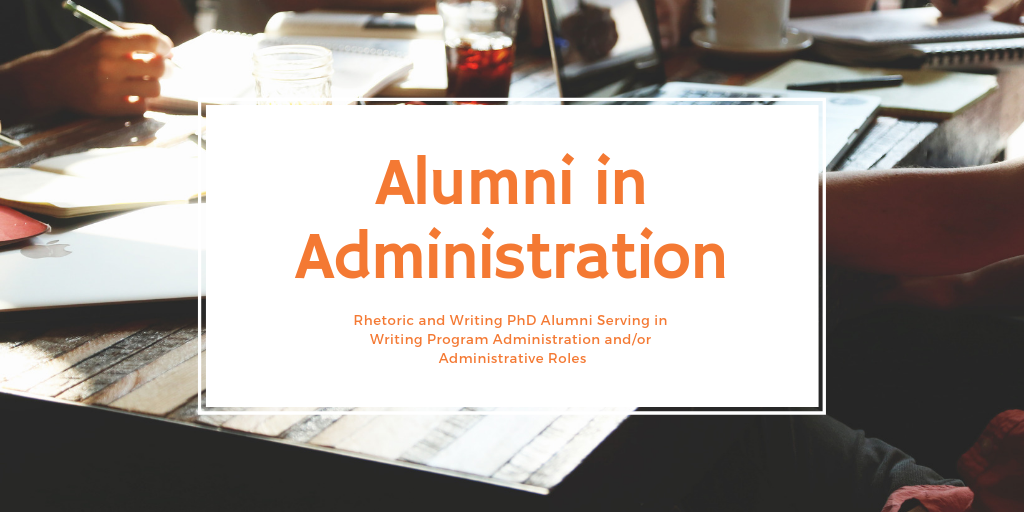Alumni in Administration

Rhetoric and Writing PhD Alumni Serving in Writing Program Administration and/or Administrative Roles
By Kristin LaFollette
There are many career options for graduates of Bowling Green State University’s Rhetoric and Writing doctoral program. This feature explores the roles that many of our alumni have taken as writing program administrators (WPAs) or as other administrators (in writing centers, as deans, etc.). We reached out to a few of our alumni to ask them about their role, how their experiences at BGSU prepared them for their position, and what they like/enjoy about their job.
Here’s what they had to say:
Dr. Christine Cucciarre (Rhetoric and Writing PhD 2008)
Director of Composition
University of Delaware (Newark, DE)
“Freshman Composition (ENGL 110) is the only class that every student at the University of Delaware has to take, and we offer more than 300 sections of it over the course of the year (which adds up to about 6100 students). I am in charge of all those classes and those who teach them, which includes about eight rotating full-time faculty members, six post-docs, more than 20 graduate students, and 30 adjuncts. I serve on or chair about ten committees across campus including our Center for Teaching and Learning advisory board, the adjunct commission, and the General Education University Committee. I’ve won all the University and College teaching awards and truly believe that BGSU helped me become the teacher, mentor, advisor, and administrator that I am today.
BGSU’s courses, the variety of classes that I was able to teach (I once taught full-time in GSW), and serving on the grad committee (and several other committees) prepared me well. I think back to my WPA course where I said, “I’m NEVER doing WPA work” because what we read was so gloomy, but here I am, director of a flagship R1 university and I can’t imagine not doing what I’m doing. Working with teachers, grad students, post-docs, and other writing faculty, running WAC workshops, and being the one that folks across campus go to for questions on writing pedagogy and initiatives is wonderful. I wake up every day high-fiving my previous self for going to grad school at BGSU in rhetoric/writing.”
Dr. Erin Laverick (Rhetoric and Writing PhD 2008)
Dean of the School of Arts and Sciences
Concordia University (Ann Arbor, MI)
“I am completing my first year as the Dean of the School of Arts and Sciences at Concordia University, Ann Arbor. Serving as a first-time dean has been challenging, invigorating, and rewarding. I put my BGSU education to use every day, specifically as the school moves forward in implementing multiple modalities for teaching and learning. Kris Blair’s classes on how to design, implement, and run online courses have served me well. In addition, Sue Carter Wood’s mentorship has really been the cornerstone of all my administrative work. My dissertation included a series of professional development in-services I designed for English language teachers. The process of developing the in-services after reviewing programmatic data really set the stage for me to develop and mature as an administrator. I really can’t say enough about the education I received at BGSU, and I am so grateful for all the support and guidance I received. Go Falcons!”
Dr. Martha Schaffer (Rhetoric and Writing PhD 2014)
Associate Director of Composition
Case Western Reserve University (Cleveland, OH)
“In my administrative capacity, I oversee our Foundations of College Writing Program, a part of our SAGES (Seminar Approach to General Educations and Scholarship) Program, which offers students seminar-based, writing-intensive general education coursework throughout their four years of undergraduate study at CWRU. Foundations serves first-year students who self-identify as needing more individualized work on their writing processes as they begin college. I also develop curriculum for our first-year writing courses, supervise our Directed Self-Placement Process for incoming students, and provide support to the English Department’s graduate teaching assistants. In my teaching capacity, I teach first-year writing, linguistics, and rhetoric in the English Department.
My experiences at BGSU provided me with excellent preparation for this position. I received superior training in research and writing assessment from the faculty at BGSU, enabling me to do that work very effectively in our writing program at CWRU. I also learned a great deal about being a good teacher from working in the General Studies Writing Program while I was a graduate student at BGSU. But, perhaps, what I think most often about in terms of my preparation is the superior role models I had in Sue Carter Wood, Lee Nickoson, and Kris Blair while I was in graduate school. They were all exceptional teachers, leaders, scholars, and administrators who instilled important values in me that guide all of the work that I do.
What I enjoy most about my job is that I work with people throughout the university in a variety of capacities, from first-year students to deans, to make writing an accessible and integral part of CWRU’s educational plan. I get to develop curriculum, do writing studies research, spend time with developing writers, and work with fellow faculty and administrators to make the program better for everyone.”
Dr. Yvonne Schultz (Rhetoric and Writing PhD 2011)
Dean, School of Arts and Humanities
Associate Vice President for Academic Administration
Mount Vernon Nazarene University (Mount Vernon, OH)
“I have multiple roles at Mount Vernon Nazarene University, my administrative ones being as Dean of the School of Arts and Humanities and as Associate Vice President for Academic Administration [AVPAA]. Both of these roles require me to ‘lead from the middle,’ working with administrators, faculty, and students. As of 2019-20, the [School of Arts and Humanities] will have four departments: Art and Design, Communication, Music, and English and History. I work closely with these department chairs on just about everything. The AVPAA role keeps work flowing smoothly, most notably at the policy- and curriculum-changing level, where decisions are made in an ordered process. I also am the voice of Academic Affairs for final decisions on things like student appeals regarding academic integrity and unexcused absences. There’s a lot more to both positions, of course.
I use my education from BGSU every single day, using rhetorical strategies to make a point, make an argument, make a difference. That my education was steeped in women’s rhetorics serves me very well at a university where women as models of leadership are everywhere except at the very top. I am among the three top-ranking women on campus, so I realize tremendous responsibility to demonstrate leadership that is not only competent but also compassionate and caring. The [Rhetoric] and Writing program’s practice of requiring us to present every time we turned around also serves me every day: I chair multiple committees and councils and present on a regular basis for all kinds of reasons.
MVNU recently completed our 10-year Higher Learning Commission documents and visit, which we passed with flying colors. I was on the editorial team, crafting the arguments and using all my rhetorical and writing skills to their maximum capacity. The process and completion of that task was enormously difficult and fulfilling (kind of like writing a dissertation, only a lot of jobs were at stake). I also love the daily problem solving that is life in higher education. And I have lately realized how committed I am to the people with whom I work: When we genuinely work together collaboratively, the results are satisfying, even when the decisions are difficult.”
Dr. Angela Zimmann (Rhetoric and Writing PhD 2007)
Vice President for Institutional Advancement
United Lutheran Seminary (Gettysburg and Philadelphia, PA)
“I currently serve as the Vice President for Institutional Advancement for United Lutheran Seminary, with campuses in Gettysburg and Philadelphia, Pennsylvania. In this position, I oversee teams on both campuses as we raise in excess of $4 million/year for the school. In the past five years, we have doubled our endowment from $30 million to over $65 million, and we now provide full-tuition scholarships for all full-time students.
The PhD in Rhetoric and Writing at Bowling Green State University prepared me well for the extensive and varied rhetorical methodologies that are used in effective fundraising and fundraising management: from individual, one-on-one visits with the CEOs of companies such as Marriott to the public speaking in front of hundreds of donors at fundraising events, the education I received prepared me to successfully negotiate the world of higher education, with the end goal being a more affordable educational experience for our students: and I know we are accomplishing that goal, as less than 25% of our students took out loans this year (compared to over 75% several years ago).
I tend to seek practical applications of theory and am delighted to say that BGSU’s PhD program in Rhetoric and Writing provided an excellent theoretical grounding for the practical position in which I currently serve.”
Updated: 08/20/2021 04:53PM

